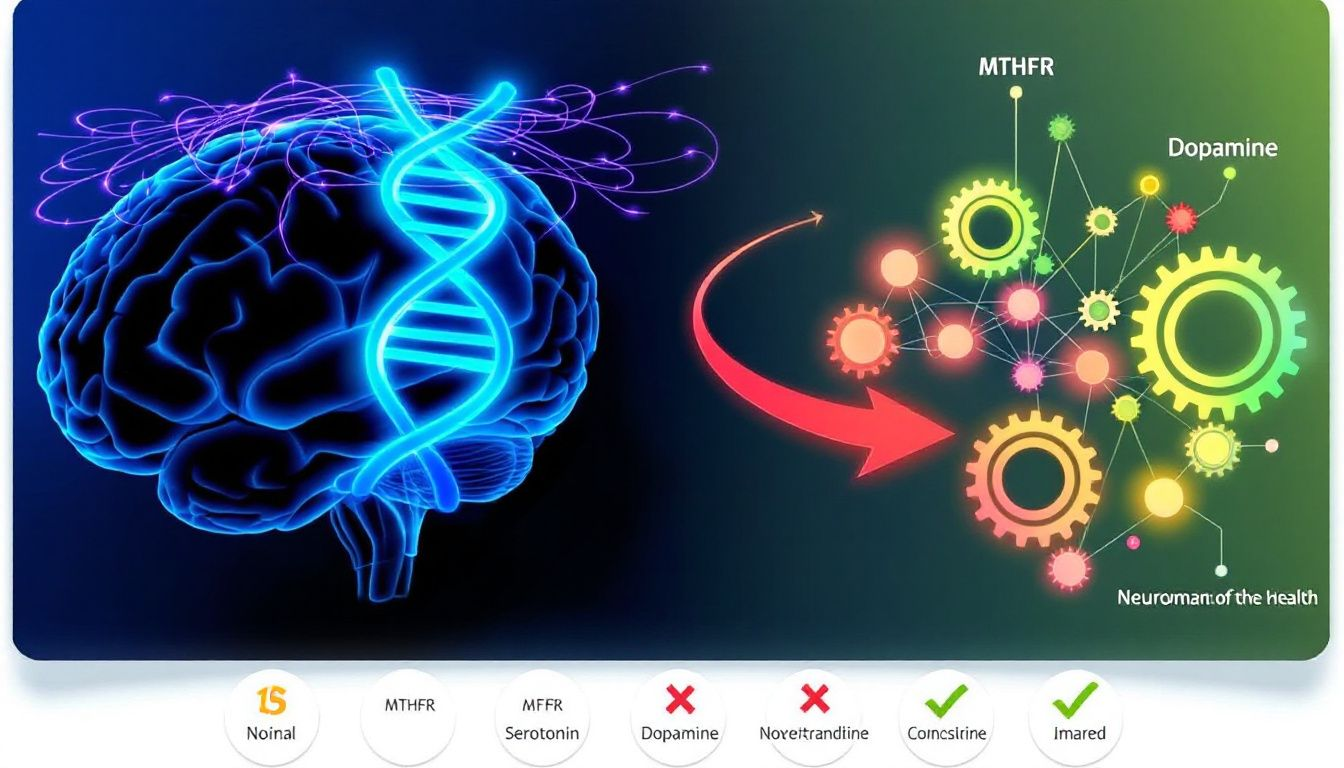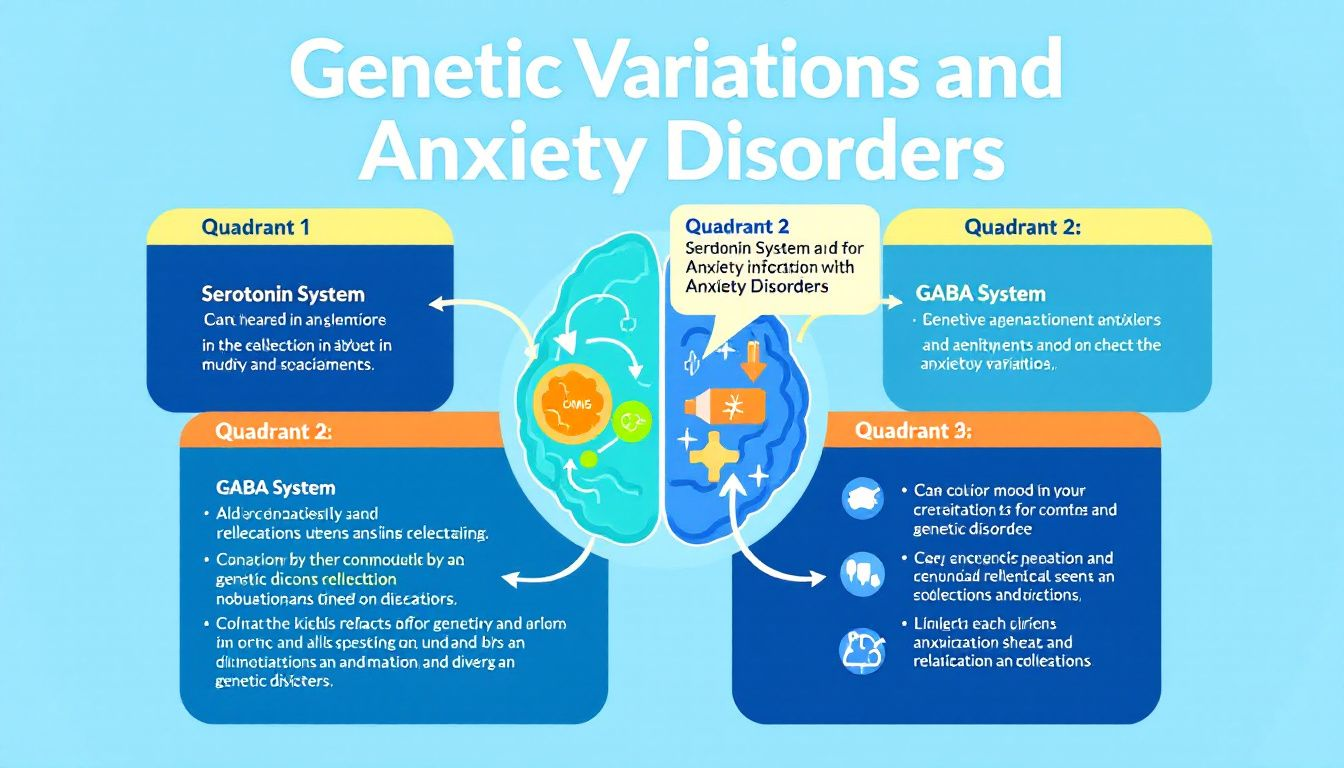If you struggle with anxiety or depression and have heard about MTHFR mutations, you might be wondering how this genetic factor could be affecting your mental health, particularly regarding mthfr and anxiety and depression. The MTHFR gene plays a vital role in how your body processes folate, which is crucial for producing neurotransmitters that regulate mood. Understanding this connection can provide insights into potential treatment options and help you take control of your mental well-being.
Key Takeaways
MTHFR gene mutations can disrupt folate metabolism, affecting neurotransmitter production and increasing the risk of mood disorders such as anxiety and depression.
Understanding specific MTHFR mutations enables individuals to recognize their risk for mental health issues and to develop proactive management strategies.
Natural remedies, lifestyle changes, and a functional medicine approach can effectively support mental health in individuals with MTHFR mutations by addressing underlying genetic factors.
Gene mutations in COMT, MAO, DDC and GAD also play significant roles in depression and anxiety.
Understanding MTHFR and Anxiety and Depression: A Guide to Better Mental Health

The MTHFR gene is a key player in the conversion of folate into its active form, l-methylfolate, which is essential for neurotransmitter production. Neurotransmitters like serotonin and dopamine are vital for regulating mood and cognitive function, and their synthesis relies heavily on the proper functioning of the MTHFR enzyme. When mutations occur in the MTHFR gene, this conversion process can be disrupted, leading to an imbalance in neurotransmitter levels and increasing the risk of mood disorders such as anxiety and depression.
Understanding MTHFR mutations is critical for comprehending their potential effects on both emotional and physical health. Genetic variations in the MTHFR gene can significantly impact neurotransmitter metabolism, which in turn affects mood regulation and mental health. Understanding these mutations and their implications enables individuals to manage their mental health proactively and enhance their overall well-being.
Introduction
MTHFR, short for methylenetetrahydrofolate reductase mthfr, is a gene that plays a crucial role in folate metabolism. Folate is a B vitamin that is essential for numerous bodily functions, including DNA synthesis and repair, as well as neurotransmitter production. Mutations in the MTHFR gene can lead to a wide range of health issues, both mental and physical. Mental health problems associated with MTHFR mutations include depression, bipolar disorder, schizophrenia, ADHD, and autism.
On the physical health side, these mutations are linked to cardiovascular disease, stroke, and osteoporosis. Earlier studies have shown a possible link between MTHFR mutations and various psychiatric disorders, suggesting that these genetic variations can significantly impact mental health.
A recent study highlighted the importance of understanding these mutations for developing effective treatment strategies and improving patient outcomes. Exploring the role of MTHFR mutations can offer valuable insights into your condition and potential treatment options, regardless of whether you have a family history of mental health issues or are experiencing symptoms yourself.
The Role of MTHFR in Mental Health

The MTHFR gene’s primary function is to convert folate into l-methylfolate, a form that the body can use to produce neurotransmitters. These neurotransmitters, such as serotonin and dopamine, are essential for regulating mood and cognitive function. When mutations occur in the MTHFR gene, this conversion process can be impaired, leading to an imbalance in neurotransmitter levels and increasing the risk of mood disorders like anxiety and depression.
Genetic variations in the MTHFR gene can disrupt the metabolism of neurotransmitters, affecting mood regulation and increasing the risk of psychiatric disorders. Understanding the role of MTHFR in mental health helps individuals appreciate the significance of maintaining adequate folate levels and addressing any genetic mutations affecting their mental well-being.
Methylation and Neurotransmitters
Methylation is a critical biological process that involves the addition of a methyl group to various molecules, including neurotransmitters. This process is essential for producing neurotransmitters such as serotonin and dopamine, which play a significant role in regulating mood and cognitive function. MTHFR mutations can impair methylation, leading to reduced levels of methylated folate, which is necessary for neurotransmitter synthesis. As a result, individuals with MTHFR mutations may experience lower levels of serotonin and dopamine, which can contribute to depressive symptoms.
Impaired methylation due to MTHFR mutations can also result in heightened levels of excitatory neurotransmitters like glutamate, exacerbating feelings of anxiety. Low levels of methylfolate can further contribute to reduced neurotransmitter availability, leading to mood disorders.
Recognizing how MTHFR mutations affect methylation can assist individuals in managing their mental health more effectively.
Impact on Homocysteine Levels
MTHFR mutations can lead to elevated levels of amino acid homocysteine, an amino acid that is naturally present in the body. High homocysteine levels are associated with various health issues, including cardiovascular disease and mood disorders. Elevated homocysteine levels can result from impaired folate metabolism due to MTHFR mutations, which can hinder the body’s ability to regulate mood effectively.
Maintaining adequate folate levels is crucial for keeping homocysteine levels in check. Elevated homocysteine levels can be a risk factor for developing mood disorders, making it essential for individuals with MTHFR mutations to monitor and manage their folate intake. Addressing how MTHFR mutations affect homocysteine levels allows individuals to take steps to enhance their mental health and overall well-being.
Genetic Variations and Anxiety Disorders

Genetic variations in the MTHFR gene, particularly the C677T variant, have been linked to an increased risk of major depression and other mood disorders. These genetic polymorphisms can impact folate metabolism, leading to disruptions in neurotransmitter levels and mood regulation. Understanding the effects of MTHFR mutations on neurotransmitter levels can provide valuable insights into the mechanisms behind anxiety disorders.
The MTHFR gene plays a crucial role in mental health, especially in relation to anxiety disorders. Exploring the genetic variations associated with MTHFR helps individuals understand their risk for anxiety disorders and manage their mental health more effectively.
Common Mutations
Common mutations of the MTHFR gene include C677T and A1298C, which can significantly impact folate metabolism and neurotransmitter production. About 45-50% of the general population has an MTHFR mutation, with variations in prevalence among different ethnic groups.
For example, the Hispanic population has a higher incidence of severe MTHFR mutations, with up to 21% affected. Recognizing these common mutations and their role in genetic variation can help individuals identify potential genetic factors affecting their mental health.
Symptoms of MTHFR-Related Anxiety
Individuals with MTHFR mutations may exhibit symptoms of anxiety and other mental health disorders, often without a formal diagnosis. Anxiety symptoms related to MTHFR mutations can include emotional turmoil, panic attacks, poor sleep, and strained relationships. These symptoms are often persistent and may not be directly related to current life situations, indicating a possible anxiety disorder.
The impairment in folate conversion due to MTHFR mutations can lead to elevated homocysteine levels, which are associated with depressive symptoms. Anxiety disorders can significantly impact daily life, making it challenging to cope with everyday situations. Identifying the symptoms of MTHFR-related anxiety enables individuals to seek appropriate treatment and support.
MTHFR and Depression: The Connection

The connection between MTHFR mutations and depression lies in the impact of these genetic variations on neurotransmitter levels. Elevated homocysteine levels due to MTHFR mutations are linked to various health issues, including psychiatric conditions. Deficiencies in neurotransmitters such as serotonin and dopamine, which are linked to MTHFR mutations, can contribute to the development of depressive symptoms.
Reduced levels of neurotransmitters like dopamine and norepinephrine, resulting from MTHFR mutations, can significantly contribute to the development of depressive symptoms. The C677T and A1298C mutations in the MTHFR gene are particularly associated with mood disorders, including anxiety and depression.
Recognizing the link between MTHFR mutations and depression aids individuals in managing their mental health more effectively.
Folate Conversion and Depression
Impaired function of the MTHFR enzyme due to mutations can hinder folate metabolism, which is crucial for neurotransmitter synthesis and mood regulation. MTHFR mutations lead to reduced enzyme activity, impairing the conversion of dietary folate into its active form, which can result in lower folate levels and depressive symptoms. Low levels of folate and vitamin B12 have been linked to increased anxiety symptoms in individuals with specific MTHFR gene mutations.
The reduced conversion of folate due to MTHFR mutations can lead to lower levels of serotonin and other neurotransmitters, which are essential for mood regulation. Addressing impaired folate conversion helps individuals improve their mental health and reduce the risk of depression, particularly with the inclusion of the folic acid form.
Neurotransmitter Production and Mood
Neurotransmitters are chemical messengers that play a crucial role in regulating mood and emotional responses. Key nutrients significantly influence mood, contributing to overall mental health. MTHFR mutations can impair the production of neurotransmitters such as serotonin and dopamine, which are vital for maintaining a stable mood and balancing brain chemicals. Decreased levels of these neurotransmitters due to MTHFR mutations can lead to mood disorders, including anxiety and depression.
Recognizing how MTHFR mutations affect neurotransmitter production offers valuable insights into managing mood disorders. Addressing the underlying genetic factors enables individuals to improve their neurotransmitter levels and overall mental health. This approach can help alleviate the symptoms of anxiety and depression, leading to a better quality of life.
Diagnosing MTHFR Mutations
Diagnosing MTHFR mutations is essential for understanding individual risks for anxiety and depression. Genetic testing can reveal specific mutations that may influence neurotransmitter levels and homocysteine metabolism, which are linked to mood disorders. Advanced Functional Medicine conducts testing for MTHFR gene mutation and functional testing for biochemistry, providing a comprehensive analysis of genetic variations.
Genetic data offers insights into health within a broader context, aiding in tailoring treatment plans to manage symptoms of anxiety and depression effectively. Elevated levels of homocysteine due to MTHFR mutations can lead to cardiovascular and other health problems, making it crucial to diagnose and manage these genetic variations.
Types of Genetic Tests
Genetic testing is essential for identifying mutations in the MTHFR gene, which can impact mental health. There are various types of genetic tests available specifically designed to detect MTHFR mutations, providing a detailed analysis of genetic variations.
These tests are often more comprehensive than standard hospital tests, offering valuable insights into methylation processes and their impact on mental health.
Interpreting Test Results
Interpreting the results of MTHFR genetic tests plays a crucial role in understanding individual risks for anxiety and depression. These tests can reveal specific mutations that may influence neurotransmitter levels and homocysteine metabolism, providing valuable insights into mood disorders. Interpreting genetic test results allows individuals to tailor treatment plans to manage symptoms of anxiety and depression effectively.
Genetic testing for MTHFR mutations can offer a comprehensive understanding of how genetic variations impact mental health. This information can guide personalized treatment approaches, helping individuals address the root causes of their symptoms and improve their overall well-being.
Natural Remedies and Lifestyle Changes

Implementing natural remedies and lifestyle changes can play a significant role in managing symptoms related to MTHFR mutations. Dietary changes, nutritional supplements, and lifestyle modifications can optimize methylation and improve mental health outcomes. Factors such as severe stress, poor diet, environmental toxins, and lack of sleep can exacerbate symptoms, making it essential to address these elements.
Advanced Functional Medicine can assist with anxiety related to MTHFR gene mutations by correcting nutritional imbalances and supporting gene mutation pathways. A comprehensive approach helps individuals address the root causes of their symptoms and enhance their overall mental health.
Diet and Nutrition
Diet and nutrition play a crucial role in managing MTHFR mutations. Increased intake of dark leafy greens, lentils, and avocados can boost folate levels, which is essential for those with MTHFR mutations. These foods are excellent sources of folate, which is vital for proper mental health. Vitamin B12 supplementation is also recommended to prevent deficiency and support overall health.
Incorporating methylated folate and B vitamins into the diet can significantly enhance mental health outcomes for individuals affected by MTHFR mutations. A nutrient-rich diet supports the body’s methylation processes and improves mental well-being.
Detoxification and Glutathione
Supporting detox pathways is crucial for individuals with MTHFR mutations because reduced methylation can impair detoxification. Eating a high-fiber diet can enhance the body’s natural detoxification processes, benefiting those with MTHFR mutations.
Detoxification is crucial for supporting mental health, particularly for individuals with genetic predispositions like MTHFR mutations.
Stress Management Techniques
Stress management techniques can be particularly beneficial for individuals with MTHFR mutations. Cognitive Behavioral Therapy (CBT) can effectively help manage anxiety by addressing negative thought patterns linked to neurotransmitter imbalances. Practicing relaxation techniques, such as meditation and deep breathing exercises, can alleviate the physiological and psychological impacts of anxiety.
Therapy that considers genetic influences can personalize coping mechanisms, making stress management strategies more effective for individuals affected by MTHFR. Supplementing with nutrients that enhance neurotransmitter function, like magnesium, can also be an important part of managing anxiety for individuals with MTHFR mutations.
Functional Medicine Approach
The functional medicine approach offers a holistic perspective by considering all aspects of a person’s health, rather than just genetic factors. Functional medicine seeks to understand how various systems in the body interact, particularly in relation to mental health. This approach integrates genetic insights with lifestyle factors to provide a comprehensive treatment plan for MTHFR-related mental health issues.
Regular physical activity, meditation, and journaling can significantly help in managing stress, particularly for those with MTHFR mutations. Functional medicine can offer personalized treatment strategies that improve overall mental well-being by addressing the root causes of anxiety disorders.
Comprehensive Assessment
Understanding the MTHFR mutation is vital for improving treatments and management strategies for various mental health conditions. A comprehensive assessment in functional medicine considers genetic, environmental, and lifestyle factors, providing a holistic view of an individual’s health.
Personalized Treatment Plans
Genetic testing can provide personalized insights for potential treatment approaches tailored to MTHFR mutations. Treatment strategies are tailored to the individual’s specific health profile and genetic predispositions, ensuring a personalized approach to managing mental health conditions.
Understanding an individual’s unique genetic makeup allows functional medicine to offer targeted treatments that address the root causes of their symptoms.
Summary
Understanding the role of the MTHFR gene in mental health is crucial for managing anxiety and depression. MTHFR mutations can significantly impact neurotransmitter production and homocysteine levels, leading to mood disorders. Genetic testing and a comprehensive approach to treatment can help individuals address the root causes of their symptoms and improve their overall mental well-being.
By incorporating natural remedies, lifestyle changes, and the functional medicine approach, individuals can take proactive steps to manage their mental health. Personalized treatment plans that consider genetic, environmental, and lifestyle factors can provide effective solutions for those affected by MTHFR mutations. Embracing this holistic perspective can lead to better mental health and a higher quality of life.
Frequently Asked Questions
What is the MTHFR gene?
The MTHFR gene plays a crucial role in converting folate into l-methylfolate, which is vital for neurotransmitter production and mood regulation. Understanding its function can provide insights into various health conditions.
How do MTHFR mutations affect mental health?
MTHFR mutations can negatively impact mental health by disrupting neurotransmitter metabolism, which may lead to increased susceptibility to mood disorders such as anxiety and depression. Addressing these mutations can be crucial for improving mental wellness.
What are common symptoms of MTHFR-related anxiety?
Common symptoms of MTHFR-related anxiety include panic attacks, poor sleep, emotional turmoil, and strained relationships, frequently occurring without an obvious cause. Recognizing these signs is crucial for seeking appropriate help.
How can genetic testing help with MTHFR mutations?
Genetic testing can identify MTHFR mutations, allowing for personalized treatment plans that effectively address associated symptoms like anxiety and depression. This targeted approach enhances the management of these conditions.
What lifestyle changes can help manage MTHFR mutations?
Adopting a balanced diet, implementing stress management techniques, and engaging in regular detoxification practices can effectively manage MTHFR mutations. These lifestyle changes can support overall mental health and alleviate related symptoms.

